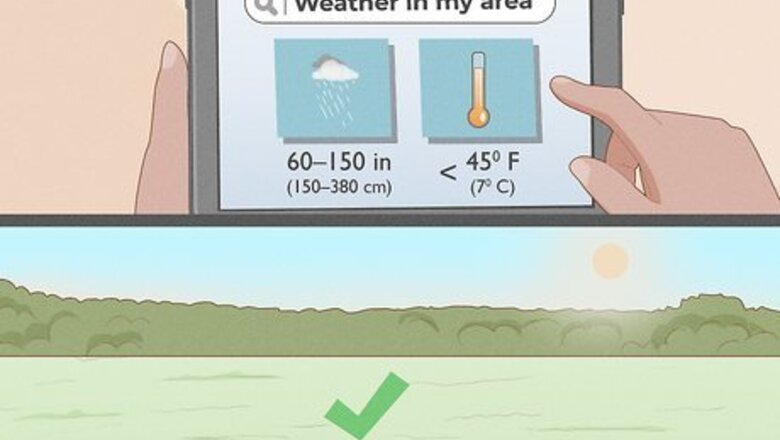
views
Planting Durian Seeds Outside
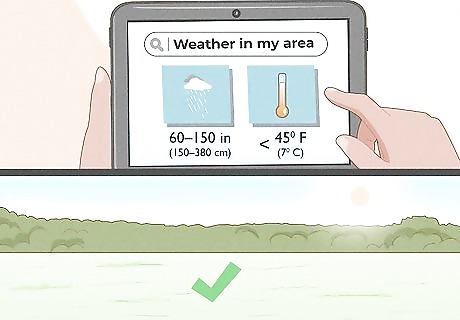
Plant your seeds outdoors if you get lots of rainfall and high temperatures. Check the internet to find out your area's rainfall and average temperatures. Only plant your durian outside if you receive somewhere between 60–150 in (150–380 cm) of rain per year, and if the temperature stays above 45 °F (7 °C). Durian trees can wither and die quickly in temperatures any lower than 45 °F (7 °C).
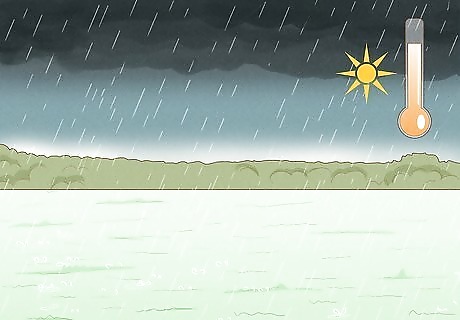
Wait for the hottest, rainiest part of the year to plant your seeds. Durian trees need copious amounts of water and high temperatures to survive. If you’re planting your durian tree outside, be sure to plant it when your area is about to get a lot of heat and rain, in order to mimic the tropical conditions in which durian trees grow.
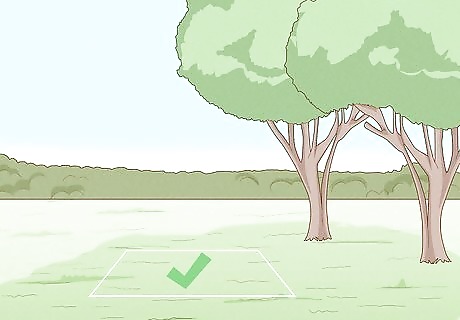
Plant the durian tree in an area with full shade. Young durian trees can easily wither with too much sunlight. Find a spot where the durian tree can receive high temperatures without high sunlight. Consider planting the tree in the shadow of other trees. EXPERT TIP Maggie Moran Maggie Moran Home & Garden Specialist Maggie Moran is a Professional Gardener in Pennsylvania. Maggie Moran Maggie Moran Home & Garden Specialist Be prepared for your durian to grow tall. According to horticulturalist Maggie Moran, “Some durian trees can grow to 150 feet (46 m) in height, with the lowest branch over 60 feet (18 m) from the ground. Keep this in mind when you choose a location for your durian.”
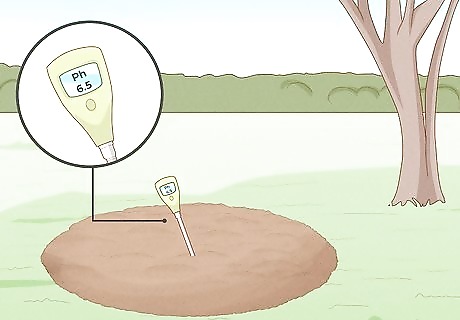
Measure the pH level of the soil before planting. To successfully grow durian, you must ensure that the soil under the tree isn’t too alkaline or acidic. Perform a soil test to check your soil’s pH balance. If your soil’s pH balance is below 6.0, add a cup of dolomite or quick lime, then test it again. If your soil’s pH balance is above 7.0, add a cup of peat moss or compost, then try again.
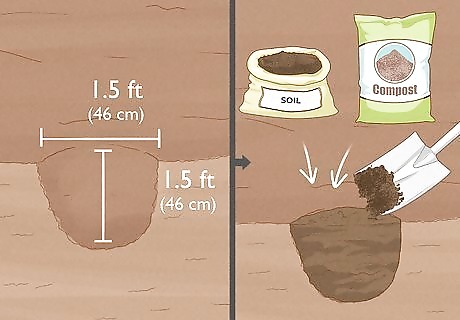
Dig a hole 1.5 ft (46 cm) and combine the soil with compost. Dig up the soil where you want to plant your durian seed at least 1.5 ft (46 cm) down and across. Combine 1 part soil with 1 part organic compost and refill the hole with the mixture. This will ensure that your durian tree has well-draining organic soil to grow from.
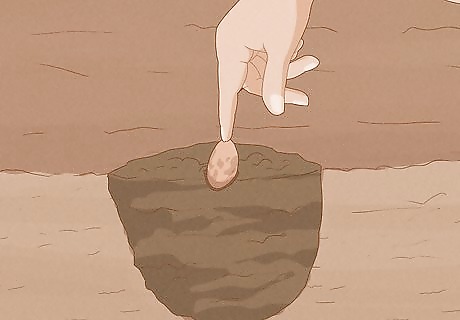
Set the seed directly from the fruit on top of the soil. Place the seed on top of the soil without burying it. Simply push the seed down a little with your finger; the majority of the seed should still be visible on top of the soil. Seeds from the durian fruit can be planted outside immediately after taking them out of the fruit, with no germination period necessary. The seed should sprout and attach itself to the soil after a day or 2.
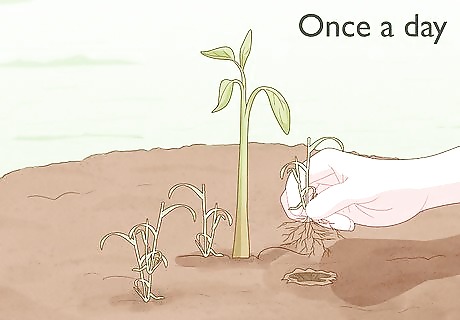
Weed around your durian tree once a day. Check for small weeds every day, as weeds will compete with the durian tree for water and nutrients. Pull weeds out with your hands, since more invasive techniques might scrape the durian’s delicate roots.
Germinating and Planting Indoors
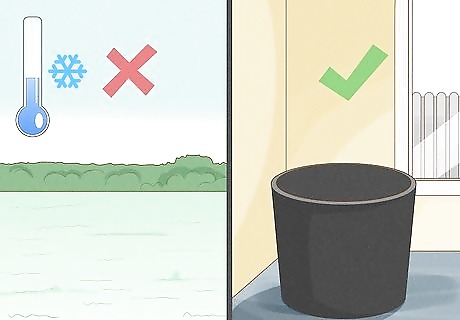
Plant your seeds in indoor pots if you live in a cold or dry climate. If your area doesn't get 60–150 in (150–380 cm) of rain per year or constant temperatures above 45 °F (7 °C), consider planting your durian inside in a 5 US gal (19 l) pot. Be sure to layer the bottom of the pot with pebbles to allow better drainage. When planting indoors, use a mix of 1 part potting soil and 1 part organic compost. This will ensure that your soil drains quickly enough for the durian tree to not drown or rot in standing water.
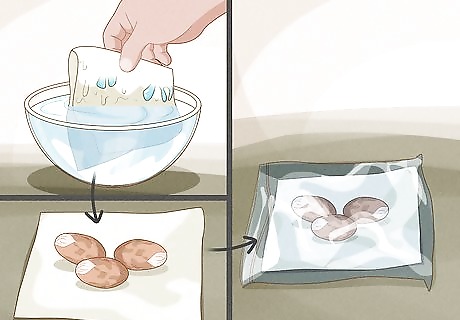
Start your seeds in a plastic bag with a soaked paper towel. Put your seeds in a plastic bag with a soaked paper towel and seal the bag. This will allow the bag to develop condensation, which will keep the seeds moist and more likely to germinate.
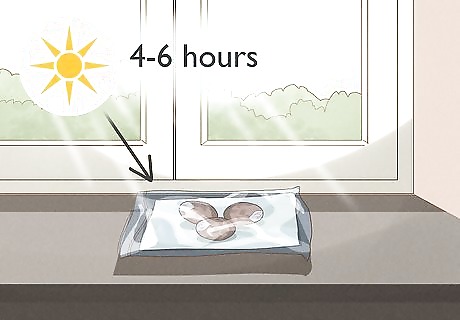
Place the bag in an area that gets 4-6 hours of direct sun. Try a windowsill or outside: the point is to get heat into the bag so that the water in the paper towel will evaporate, creating a water cycle that will nourish the seed. If you can't keep your seeds on a windowsill or outside, try keeping them under a grow light.
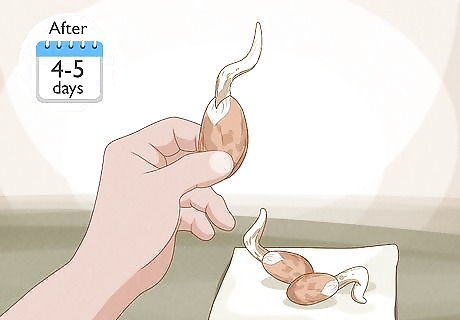
Check for roots after 4-5 days. After 4-5 days, the durian seeds should be growing roots. Look for small yellow or brown tendrils coming out of the seeds and plant them when the roots are longer than the seed itself.
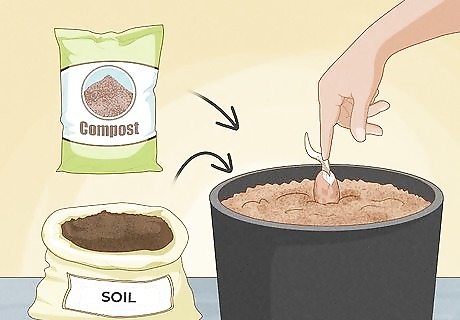
Place the seeds on top of potting soil and compost in a pot. Gently push the seeds down onto the soil, but don't push them all the way in. Durian plants root themselves by standing up on top of the soil, so make sure you leave the majority of the seeds above the soil line.
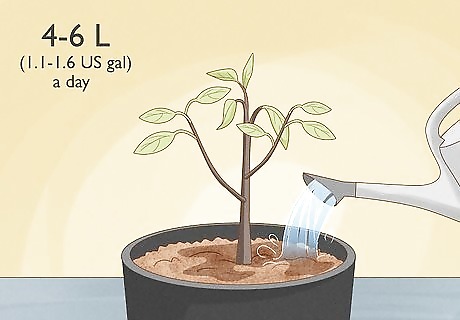
Water your durian tree every day. Make your durian tree is receiving 4–6 L (1.1–1.6 US gal) of water a day. Spread this water out between the morning and the afternoon. Once your durian tree starts producing fruit, increase this to 6–8 L (1.6–2.1 US gal).
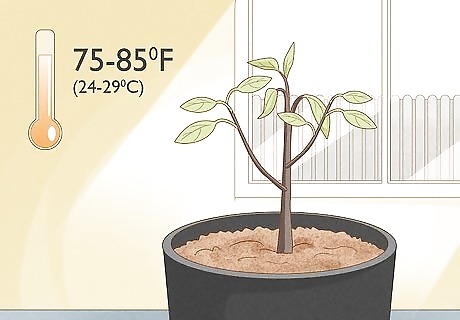
Keep the temperature around 75–85 °F (24–29 °C). A durian tree's native environment stays around 75–85 °F (24–29 °C), so if you want your plant to thrive, you should mimic that environment. Remember that durian plants can wither and die in temperatures below 45 °F (7 °C).




















Comments
0 comment